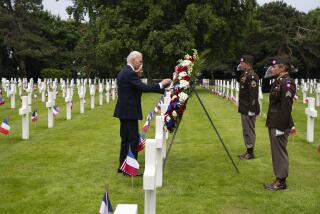Bush Likens War on Terror to WWII
- Share via
COLORADO SPRINGS, Colo. — Drawing comparisons to World War II, President Bush on Wednesday called on the nation and the world to battle against what he called the “murderous ideology” of terrorism, a threat he compared to communism and fascism in the global scale of its brutality.
“Like other totalitarian movements, the terrorists seek to impose a grim vision in which dissent is crushed, and every man and woman must think and live in colorless conformity,” Bush told 981 cadets graduating from the U.S. Air Force Academy here. “So to the oppressed peoples everywhere, we are offering the great alternative of human liberty.”
Bush said Iraq was now a testing ground for his strategy to fight terrorism. His 47-minute speech was the second in what White House officials say will be half a dozen addresses on Iraq. Polls show that Americans say they are increasingly worried about events in Iraq as the U.S.-led coalition prepares to transfer sovereignty to an interim government on June 30.
Invoking World War II and the Cold War, Bush said the United States was leading the world in a struggle similar to the cataclysms of the 20th century, and he told the graduates that they were joining a fight as momentous as those waged against Adolf Hitler and Josef Stalin.
“This is the great challenge of our time, the storm in which we fly,” Bush said. “History is once again witnessing a great clash.”
Bush mentioned last weekend’s dedication of the National World War II Memorial in Washington and next week’s D-day commemorations in France as he described the current struggle against terrorism as a similar battle between freedom and tyranny.
He said that in the terrorists’ vision of the world, “books are burned, terrorists are sheltered, women are whipped, and children are schooled in hatred and murder and suicide. Our vision is completely different. We believe that every person has a right to think and pray and live in obedience to God and conscience, not in frightened submission to despots.”
He described deposed Iraqi leader Saddam Hussein as “a state sponsor of terror with a history of using weapons of mass destruction.”
Bush leaves today for a week of travel and diplomacy, first in Europe, where he will attend the D-day commemorations, and then at the annual G-8 summit in Sea Island, Ga., which is expected to be dominated by discussions on Iraq.
Bush’s presumed Democratic rival in the November election, Sen. John F. Kerry of Massachusetts, challenged the president’s characterization of Iraq’s role in the fight against terrorism.
Campaigning in Tampa, Fla., Kerry was asked by reporters if Iraq was a main front in the anti-terror campaign. “The main front in the war on terror is in 60 countries around the world, with Al Qaeda and hosts of other radical organizations.... No one in the intelligence community, no one in the world fighting the war on terror, ever suggested that there was a link of Iraq to 9/11,” Kerry said.
“It was the weapons of mass destruction which were given to the Congress as the primary cause and rationale for our involvement. So I think that’s once again misleading America, frankly,” he said.
Bush, in his speech to the Air Force cadets, was careful to insist that the clash of ideologies should not be seen as a clash of civilizations or of religions.
“This is not a clash of religions,” he said. “The faith of Islam teaches moral responsibility that ennobles men and women, and forbids the shedding of innocent blood. Instead, this is a clash of political visions.”
One difference between the past and present, Bush said, is that the ideology of terrorism “has not yet taken control of a great power like Germany or the Soviet Union.”
“And so the terrorists have adopted a strategy different from the gathering of vast and standing armies. They seek, instead, to demoralize free nations with dramatic acts of murder,” the president said.
Alex Roland, a Duke University military historian, said that by invoking World War II so close to the 60th anniversary of D-day and the unveiling of the memorial on the National Mall, Bush was trying to latch the increasingly controversial war in Iraq to the popular victories of the “greatest generation.”
But Roland said that unlike the war on terrorism, the campaigns against Japan, Italy and Nazi Germany presented obvious foes and clear-cut battlegrounds.
He added that World War II was far more encompassing for average Americans.
“If I were having this dialogue with the president, I’d say, ‘If your parallel holds true, then why have we not mobilized? Why not institute the draft? Why not have rationing in the country?’ ” Roland said. “This is nothing like World War II. Maybe someday it will be.”
Also on Wednesday, Congress moved toward providing the additional $25 billion that Bush has sought to fund U.S. military operations in Iraq and Afghanistan.
The Senate voted 95 to 0 to authorize the additional funding as part of a defense bill expected to win approval within the next several days.
The U.S. has already spent $120 billion in Iraq and Afghanistan.
The Senate vote came after Sen. Lindsey O. Graham of South Carolina broke ranks with many of his fellow Republicans and formed an alliance with Democratic Sen. Hillary Rodham Clinton of New York to win approval of a measure that would provide members of the National Guard and Reserve with increased government-funded health benefits.
Graham was one of the House prosecutors in the impeachment trial of Clinton’s husband, President Clinton.
Times staff writers Maria L. La Ganga in Tampa and Peter Wallsten and Richard Simon in Washington contributed to this report.
More to Read
Get the L.A. Times Politics newsletter
Deeply reported insights into legislation, politics and policy from Sacramento, Washington and beyond. In your inbox three times per week.
You may occasionally receive promotional content from the Los Angeles Times.










